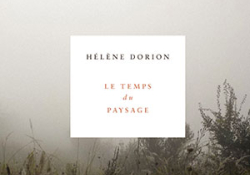Cœurs, comme livres d’amour by Hélène Dorion
 Montréal. Editions de l’Hexagone. 2012. ISBN 9782896480067
Montréal. Editions de l’Hexagone. 2012. ISBN 9782896480067
A modern-day troubadour, Hélène Dorion stands outside linear, dualistic thinking in order to examine the existential and physical states of the heart. At the core of Cœurs, comme livres d’amour, is the heart’s power to transform, its gift of life. We sit with Rilke before the “curtain of the heart” to see its concealed “reflection, echo, perhaps illusory presence.” The heart provides a warm and happy place of rest, where to park lovers’ silences, a counterpoint to violence. But it is also a dark stain, blood-filled, self-contained, a rock whose heavy presence is the matrix of the infinite, a minuscule island, a fragile truth, transforming fire, wound. More importantly, it is the alpha and omega of seasons, desire, breath, sounds, light, happiness; it is altogether enigma, resemblance, symmetry, and false pretenses. It points to the meeting place of wave and shore, flower and dawn, window and landscape. It is a border that points to a journey, where words begin: “I enter / inside the poem / that wills itself on a long journey / to meet what only / time may greet.”
Caught within this grand drama, lovers are meditative, almost disincarnate figures, segues to the outer world, tangible yet vanishing signs of a renewed relationship with the world. They appear to become almost one with trees, rocks, sand, wind, and water, blending with elements that are superimposed like translucent fabrics. To better heal, words are woven a thousand times until they create this true representation, in an infinite combination of images and sensations, nuances and echoes. In previous works, Dorion has used this technique to probe the relationship of man to time, space, and the city, ceaselessly redefining meaning through words, mending brokenness with oneness and fragility with permanence. Her finely crafted, palimpsestic technique is widely appreciated not just in Canada, where she has won numerous awards, but in more than twenty countries where her poetry has been translated in nine languages.
Cœurs, comme livres d’amour is organized in four parts, representing four stages of love’s transformational quest: taking stock of the present, examining love’s possibilities, listening to admonitions to change, and embarking on the journey. Each part is informed by advice from great poets. Opening the fourth part, Mario Luzi invites us to look for the light that fills the heart. Dorion follows suit with three poems dedicated to dawn’s promise of a new journey; tucked in the middle is an extraordinary dialogue between opposite seasons (spring/fall and summer/winter). Entitled “Bientôt nous quitterons l’éblouissant jardin” (Soon we shall leave the shining garden), this long poem affirms the world’s ceaseless counterpoints. In this celebration of light and love, the poet takes her leave: “To see and rejoin, I choose / what escapes me / and bares me.”
Alice-Catherine Carls
University of Tennessee at Martin


